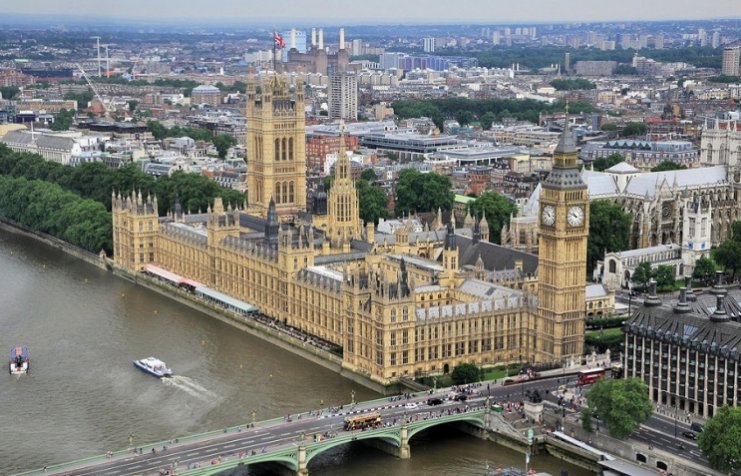The DUP-Conservative Confidence-and-Supply Agreement: A Patron-Client relationship.
- Government and Corruption

- Mar 19, 2019
- 4 min read
Updated: Mar 20, 2019

Following the results of the UK 2017 General Election, the Conservative Party failed to gain a majority in the House of Commons but remained the largest single party. This resulted in the formation of a minority government through a confidence-and-supply arrangement with the Democratic Unionist Party (DUP). The agreement (Tonger, 2017) saw the DUP agree to support the Conservative minority government on important bills and legislation, especially motions of no-confidence and Brexit-related legislation.
In exchange, the Conservatives agreed to an ongoing commitment to the Union of Great Britain and Northern Ireland, and to support various other DUP interests in Ireland. The deal also saw an extra £1 billion of funding for Northern Ireland without an increase in the budgets in Scotland and Wales in accordance with the Barnett formula. Was this agreement a skilful and tactical political negotiation on the part of Theresa May, or a corrupt and informal practice of buying support in parliament?
A Patron-Client relationship?
According to Manfred Schmidt (1995 cited Lauth 2012 pg 52) clientelism is a ‘specialist term for forms of protective relationships of mutual benefit between a person or persons occupying a higher place in the social hierarchy (patron) and a follower concerned with the protection and the acquisition of certain advantages (clients).’ Though the situation with between the DUP and Conservatives have little to do with social hierarchies, the confidence-and-supply relationship may be seen as a political patron-client relationship in which the Conservatives are the patrons in that provide £1 billion to Northern Ireland in payment for the DUP as clients to for the Conservatives in Exchange. In Figure 1 the dotted line is used to represent the fact that the DUP are not required to vote with the Conservatives on all matters and that they will occasionally vote with the Conservatives simply due to similar political beliefs.

Figure 1. Model of Patron-Client Relationship Between the DUP and Conservatives
It needs to be noted that this patron-client relationship differs from normal since the Conservative Party as the Patron does not have full control of the relationship. Were the DUP to exit from the relationship or not vote with the Conservatives on matters that were previously agreed, the Conservatives will continue to have to pay the promised money to Northern Ireland, but may potentially once again end up with no majority, leaving them in a position where they may lose their right to be in government. The relationship relies heavily on Theresa May’s ability to deliver the Brexit the DUP want, and on the DUP continuing to believe that they are better off with the Conservatives, and not Labour in government. Additionally, due to the fact that Northern Ireland doesn’t require the £1 billion to survive, the relationship lacks the urgency of regular patron-client relationships.
The relationship also lacks the long-term implications that regular patron-client relationships have when they occur between citizens and parties/ politicians. In contrast, the DUP-Conservative relationship lasts only until the next General Election which, at the latest, will occur in 2022.
The DUP-Conservative Relationship Impact on Northern Irish Assembly
Following the signing of the Belfast and Good Friday agreement, the Northern Irish Assembly was created in a way that means that major parties could not be excluded from participation in government, with the system enforcing a power-sharing structure. Due to this the two largest parties must enter a mandatory coalition. Were the two largest parties refuse to take part, the Executive cannot function. After Martin McGuinness resigning his post as Deputy First Minister, a fresh election in March 2017 was called. Following the election Sinn Féin and the DUP were unable to reach a deal within the 3 allocated weeks, leading them to be unable to form an Executive, and leaving Northern Ireland without a government ever since.
The DUP-Conservative agreement may diminish the prospect of the reassembling a functioning government in Northern Ireland. There is an option for a return to direct rule from Westminster, this could cause issues for the DUP. Direct rule would lead to a disintegration of the delicate institutional machinery of the Good Friday Agreement. For the DUP, the direct rule could mean that Westminster could institute same-sex marriage, make abortion legal (Tonger, 2017), as the Conservatives are overwhelming more liberal on those matters than the DUP, and the House of Commons is overall quite likely to vote in favour of both. Such actions could collapse the DUP-Conservative agreement, and therefore is unappealing to Theresa May who needs a parliamentary majority in order to pursue her Brexit deal.
The other option is for Sinn Féin to return to the Irish Assembly. However, Michelle Neill, Sinn Féin’s leader in Northern Ireland refuses to work alongside Arlene Foster due to various grievances against the DUP. Finally, another election could be called in Northern Ireland. However, such an election is unlikely to solve the underlying issues in Northern Ireland, as the two major parties would still have to enter a power-sharing agreement.
Political Negotiation or Informal Governance?
Confidence-and-supply relationships are formalised agreements in the UK political system. Political negotiation between political actors is common in parliamentary democracies, and a necessary step for both coalition formation and everyday parliamentary operations. It would be incorrect to assume that the agreement between the DUP and the Conservatives is informal however, it is also incorrect to assume that its legal formality precludes it from having informal aspects.
Taking into account the situation in the Northern Irish Assembly the agreement has some unwritten agreements that benefit the DUP and Conservatives while leaving Northern Ireland without a functioning government for over 2 years.
Perhaps this example is a perfect illustration of the double standard when it comes to informal governance in Western countries. A similar situation in a non-Western country would be easily equated to corruption or informality.
Word count: 988
Cited sources:
Lauth, H. (2012) ‘Informal governance and democratic theory’ in Christiansen, T. and Neuhold, C. (ed.) International Handbook on Informal Governance. Cheltenham: Edward Elgar, pp. 40-64, pg. 52
Tonge, J. (2017) ‘Supplying Confidence or Trouble? The Deal Between the Democratic Unionist Party and the Conservative Party’, The Political Quarterly, 88 (3). Pp. 412-416







Comments